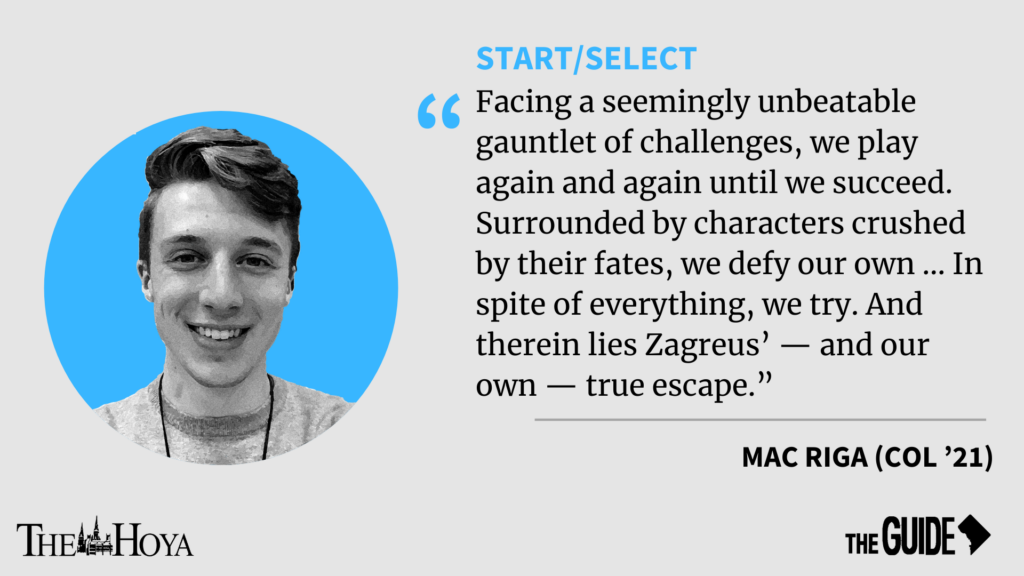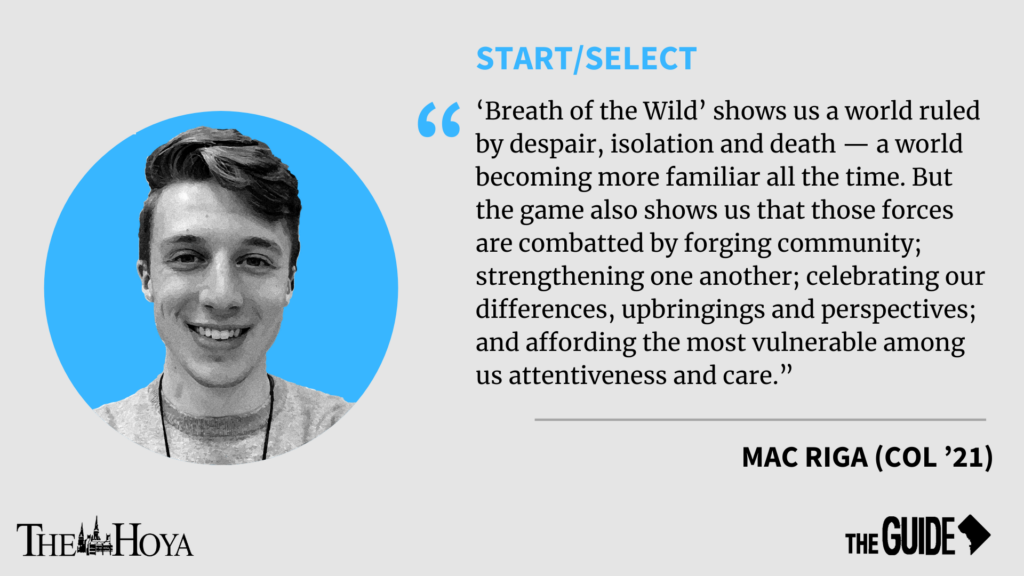I woke up Friday and learned that the people I love most in this world would be away from me months early because of a pandemic that has expanded beyond our control. In just a few days, I would be facing a loneliness more crushing and overwhelming than anything I could remember. I could not help but think of “Shadow of the Colossus.”
The world of the game is boundless, beautiful and almost entirely empty. The only characters aside from the protagonist are your horse and a disembodied voice who speaks in a discordant tone for a few seconds every time you clear an objective. Those objectives are the 16 colossal bosses in the game, the only other living things populating the world. The vast majority of the game is spent alone, wandering this extensive world in near silence. It is haunting and serene, lovely and full of despair.
Long stretches of solitary wandering are punctuated by the game’s boss fights that are pulse-pounding and explosive. So the game goes: hours of silent and contemplative exploration, a few minutes of thrilling action, a mournful and guilt-ridden anticlimax, and repeat. And then the game ends, and then perhaps your character dies and then the credits roll.
Team Ico published “Shadow of the Colossus” in February 2006. It was its second game after “Ico” and is one of the most beautiful, important and poignant works of art that video games, as a medium, have to offer.
Video games have always existed in a strange, liminal zone between interconnectivity and introversion. Many of the earliest video games were experiences that required multiple players, yet the entire concept of video games is based on eliminating the need for human interaction in playing a game.
As the art form developed, more and more gamemakers became interested in using the medium to tell stories and ignite the player’s empathy for fictional characters. The shift did not do away with multiplayer video gaming, and multiplayer gaming has indeed thrived over the years, but it did cement the medium in this strange middle ground. Most games had become solitary ones but also, simultaneously, empathetic experiences.
Team Ico has always been interested in exploring this dynamic. The studio’s other games “Ico” and “The Last Guardian” both use a protagonist who must rely wholeheartedly on a companion to solve the games’ puzzles and combat encounters. “Shadow of the Colossus,” however, took a drastically different approach.
“Shadow of the Colossus” is not a game concerned with preserving the player’s feelings. Instead, it forces the player to seep in a pervasive, consuming sense of loneliness, and even begin to resent it.
Yet this is a game that sees the beauty in loneliness, along with its brutality. Vast, calm and natural landscapes punctuated by mysterious, crumbling ruins are the backdrop to the rhythmic, hypnotic hoof falls of your horse as you journey across rolling plains and through towering canyons to your next objective. The silent stretches are harrowing, but also introspective. They give the time and space for reflection and remembrance without passing judgement or influencing the player’s thoughts on what they’ve done and what they continue to do.
“Shadow of the Colossus” effectively portrays this duality because it understands the difference between being lonely and being alone. It understands that someone facing the prospect of losing their friends but not having lost them yet can while away hours alone in their room and be totally content. It also understands the crippling, crushing sadness and hopelessness that same person will feel in a week once their friends are scattered across the country. It understands all of this and translates it beautifully, succinctly and unforgettably.
The emptiness of the “Shadow of the Colossus” world isn’t a mistake. Team Ico didn’t forget to program grunt enemies or colorful characters selling potions. People talk about “Shadow of the Colossus” as if it were a stroke of luck born of technical limitations, but the silence and isolation of the game feels anything but unintentional.
Team Ico sought to make a game that laid bare the contradiction of video games. It held up this beautiful medium, the pinnacle of self-isolation and escapism yet one that fosters empathy and self-reflection more than any other, and begged the player to wrestle with that irony — to come to their own conclusions about what it means to be alone, what it means to consume video games and what it means to do both simultaneously.
I think it means that for us, loneliness is more good than it isn’t. I think it means that we need to be lonely sometimes, because it’s only when we’re alone and especially when we’re lonely that we start to understand ourselves. Losing yourself is easy, even fun to do.
But maybe that’s just the desperate rationalizing of someone who’s staring down far more lonely days to come.
Mac Riga is a junior in the College. START/SELECT will appear in print and online every other Friday.





















